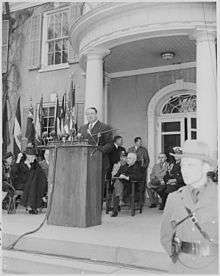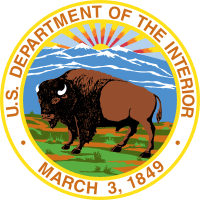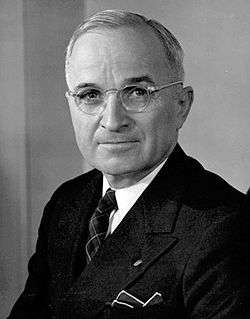Julius Albert Krug
| Julius A. Krug | |
|---|---|
 | |
| 33rd United States Secretary of the Interior | |
|
In office March 18, 1946 – December 1, 1949 | |
| President | Harry S. Truman |
| Preceded by | Harold L. Ickes |
| Succeeded by | Oscar L. Chapman |
| Personal details | |
| Born |
November 23, 1907 Madison, Wisconsin |
| Died |
March 26, 1970 (aged 62) Knoxville, Tennessee |
| Resting place | Arlington National Cemetery, Arlington, Virginia |
| Nationality | American |
| Political party | Democratic |
| Spouse(s) |
Margaret Catherine Dean Krug (1905 - 1986) |
| Children |
Marilyn Krug Grether James Allen |
| Alma mater | University of Wisconsin–Madison |
| Military service | |
| Service/branch | United States Navy |
Julius Albert Krug (November 23, 1907 – March 26, 1970) was a politician who served as the United States Secretary of the Interior for the administration of President Harry S. Truman from 1946 until 1949.
Historical life
Krug was born November 23, 1907, in Madison, Wisconsin, to son of Julius J. Krug (1877 - 1971) and the former Emma M. Korfmacher (1877 - 1949). Krug graduated from what is now the University of Wisconsin–Madison in 1929. His first notable jobs were with the Tennessee Valley Authority, where he worked as chief power engineer, and then manager of power. In 1941, Krug was promoted to chief of the power branch of the Office of Production Management. After the beginning of World War II, this office became the War Production Board. Krug was promoted to director of the Office of War Utilities in 1943. In April 1944, Krug enlisted in the United States Navy. He was recalled that August to serve as chairman of the War Production Board, where he served until the board's dissolution in November 1945.
Secretary of the Interior

President Truman nominated Krug for the position of Secretary of the Interior on February 26, and Julius Krug took office on March 18, 1946. As Secretary, Krug opposed lumber companies' efforts to gain logging rights to huge forests in Washington state, and opposed the building of unnecessary dams. As the administrator of coal mines in the United States, he led failed negotiations between John L. Lewis and mine owners in an attempt to end a nationwide strike by the United Mine Workers of America.

In August, 1949, Krug chaired the 19-member United States Citizens Committee that participated in the United Nations Scientific Conference on Conservation and Utilization of Resources, held at Lake Success, New York. Other members of the committee included Herbert Hoover, Thomas Watson, Howard E. Babcock, and Randolph Greene Pack.[1]
Later life and death
Krug resigned from the cabinet effective on December 1, 1949, and he moved on the private industry as a utilities consultant in Washington. He also served as the chairman of the board of Brookside Mills, and a cofounded the Volunteer Asphalt Company in the Knoxville, Tennessee.
He died there on March 26, 1970, at the age of 62, and is interred at the Arlington National Cemetery in Arlington, Virginia. He and his wife, Margaret Catherine Dean, had two children; a daughter, Marilyn Krug Grether, and a son, James Allen Krug.
References
| Wikimedia Commons has media related to Julius Albert Krug. |
- ↑ New York Times. August 6, 1949. "U.S. Names Group to Resources Talk; Hoover on Citizens Committee That Will Attend U.N. Meeting of Experts Here Aug. 17"
| Political offices | ||
|---|---|---|
| Preceded by Harold L. Ickes |
U.S. Secretary of the Interior Served under: Harry S. Truman 1946–1949 |
Succeeded by Oscar L. Chapman |

